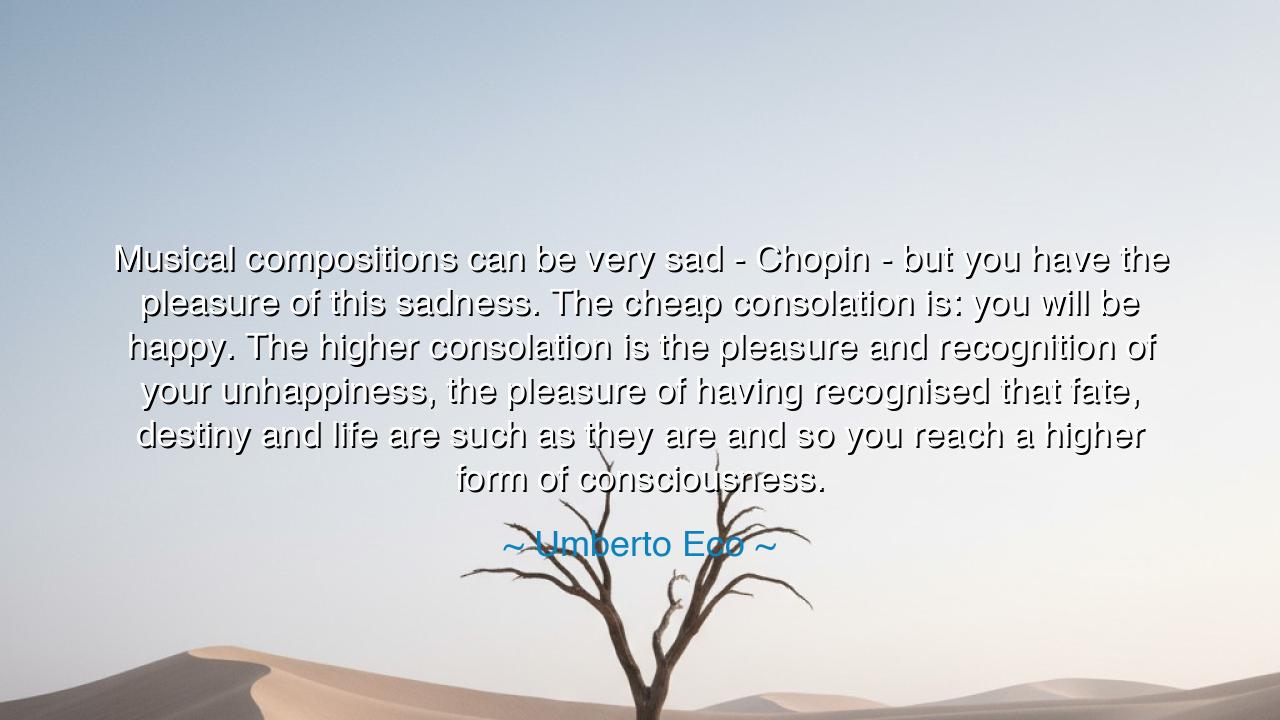
Musical compositions can be very sad - Chopin - but you have the
Musical compositions can be very sad - Chopin - but you have the pleasure of this sadness. The cheap consolation is: you will be happy. The higher consolation is the pleasure and recognition of your unhappiness, the pleasure of having recognised that fate, destiny and life are such as they are and so you reach a higher form of consciousness.






Hear, O listeners, the words of Umberto Eco, philosopher of symbols and seeker of hidden truths: “Musical compositions can be very sad—Chopin—but you have the pleasure of this sadness. The cheap consolation is: you will be happy. The higher consolation is the pleasure and recognition of your unhappiness, the pleasure of having recognised that fate, destiny and life are such as they are and so you reach a higher form of consciousness.” At first, these words may sound paradoxical—how can one find joy in sorrow? Yet they carry the wisdom of the ancients: that to truly live, one must embrace not only light but also shadow.
Mark first the example of Chopin, the master whose music drips with longing and melancholy. His nocturnes and preludes speak of sorrow more profound than words can carry. And yet, listeners do not flee from these sad notes; they seek them out, finding in them a bittersweet beauty. This is the mystery Eco unveils: the pleasure of sadness. It is not the denial of grief, but the transformation of grief into something bearable, even beautiful.
He warns against the cheap consolation: the false comfort that insists, “You will be happy.” This is the easy promise the world often gives, a surface balm that denies the reality of suffering. But Eco reminds us that such consolation is shallow, for it seeks to erase pain rather than understand it. The deeper, truer path is the higher consolation: to acknowledge sorrow as part of life’s essence, to recognize it without fear, and in that recognition, to find strength.
Consider the story of the Stoics of ancient Rome. They did not tell men that happiness was always around the corner, nor did they pretend suffering could be avoided. Instead, they taught that life itself—whether joy or grief, gain or loss—must be embraced as part of nature’s order. Marcus Aurelius, emperor and philosopher, wrote in his Meditations that to accept pain without complaint is to be at peace with the universe. In this, Eco’s thought finds kinship: consciousness rises higher not by rejecting sorrow, but by understanding it.
The phrase fate, destiny, and life are such as they are speaks with the force of inevitability. To fight against reality is to exhaust the soul, but to recognize it is to reach calm wisdom. This recognition is not despair, but liberation. For when one accepts that sorrow belongs to existence, sorrow loses its power to enslave. The pleasure of unhappiness is not the enjoyment of misery, but the profound relief that comes with acceptance.
Thus, Eco teaches us that sadness can be art’s greatest gift. A song, a painting, a poem that reveals sorrow allows us to look upon our own pain with clarity and without shame. When we recognize our fragility, we also recognize our humanity. In this recognition, we grow more conscious, more compassionate, more alive.
So take this lesson, O listener: do not run from sorrow. When life places grief upon your shoulders, do not rush to erase it with empty promises. Sit with it, name it, and learn from it. Let music and art guide you, as Chopin’s piano guided generations, into the strange pleasure of recognition. In your own life, practice acceptance: when joy comes, embrace it fully; when sorrow comes, let it teach you. For in both, you are alive, and in both, you may rise to a higher form of consciousness that no false comfort can ever give.






AAdministratorAdministrator
Welcome, honored guests. Please leave a comment, we will respond soon